Affiliate links on Android Authority may earn us a commission. Learn more.
Samsung made impressive gains in the US thanks to S24, as Google stutters
May 9, 2024

- Samsung’s US market share grew to 31% in Q1 2024, according to a new report, up from 27% a year ago.
- This is the company’s highest Q1 market share in four years, and was attributed to the Galaxy S24 series.
- Google suffered a decline in market share that was attributed to the S24’s performance.
The US smartphone market has been dominated by Apple in recent years, with Samsung falling further behind the iPhone maker. There’s some encouraging news for Samsung in the latest US market share report, though.
Counterpoint Research reports that US smartphone shipments declined by 8% year-on-year in Q1 2024. Apple’s share of the market stayed flat at 52%, matching its share from a year ago. However, Samsung’s share of the market grew to 31%, up from 27% a year ago.
In fact, Counterpoint noted that this was Samsung’s best Q1 market share in the US since Q1 2020. The tracking firm attributed the Galaxy maker’s performance to the earlier release of the Galaxy S24 series, which was launched on January 17. By comparison, the Galaxy S23 range launched on February 1. Counterpoint also reported that there was stronger demand from owners of old Galaxy phones wanting to upgrade.
Samsung’s performance came at the expense of Google, as Counterpoint confirmed to Android Authority that the search giant’s market share dropped compared to a year ago.
“Google declined in market share in Q1. It faced stiff competition from Samsung’s S24 launch. We also saw reduced volumes towards the end of the quarter as Google was gearing up for the launch of the 8a just a few days ago,” Counterpoint senior research analyst Maurice Klaehne told us.
The industry tracker also noted that Android shipments had declined by an unspecified figure year-on-year. Counterpoint cited increased consolidation in the low-end and the switch from LTE to 5G models by carriers. It also explained that increased costs associated with 5G made things tough for Android OEMs offering low-end devices.
